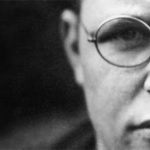Previously:
- Vorvort (Foreword): 1 2 3 4 5 6 7 8 9
- Inhaltverzeichnis (Table of contents) 10
- 1. Die Teure Gnade (1. Costly Grace) 11 12 13 14 15 16 17 18 19 20 21 22 23 24 25 26 27 28 29 30 31 32 33
- 2. Der Ruf in die Nachfolge (2. The Call to Discipleship) 34 35 36 37 38 39 40
Der erste Jünger trägt Jesus die Nachfolge selbst an, er ist nicht gerufen, die Antwort Jesu verweist den Begeisterten darauf, daß er nicht weiß, was er tut. Er kann es gar nicht wissen. Das ist der Sinn der Antwort, in der dem Jünger das Leben mit Jesus in seiner Wirklichkeit gezeigt wird. Hier spricht der, der zum Kreuz geht, dessen ganzes Leben im Apostolikum mit dem einen Wort „gelitten“ bezeichnet wird. Das kann kein Mensch aus eigner Wahl wollen. Es kann sich keiner selbst rufen, sagt Jesus, und sein Wort bleibt ohne Antwort. Die Kluft zwischen dem freien Angebot der Nachfolge und der wirklichen Nachfolge bleibt aufgerissen.
The first disciple proposes to follow Jesus himself (in Luke 9:57), he is not called, [and] Jesus’s answer points out to the excited one that he knows not what he is doing. He can not know it really. That is the purpose of the answer, in which the life with Jesus in its reality is shown to the disciple. Here speaks the one, who to the cross goes, whose entire life in the Apostle’s (Creed) is summed up in a word “suffered”. That, no one can want out of their own choice. No one can call themselves, says Jesus, and his word remains without an answer. The divide between the free offer of discipleship and real discipleship remains torn open.
Wo aber Jesus selbst ruft, da überwindet er auch die tiefste Kluft. Der zweite will seinen Vater begraben, bevor er nachfolgt. Das Gesetz bindet ihn. Er weiß, was er tun will und tun muß. Erst soll das Gesetz erfüllt werden, dann will er folgen. Ein klares Gebot des Gesetzes steht hier zwischen dem Gerufenen und Jesus.
But where Jesus calls himself, he overcomes even the deepest divide. The second [disciple] wants to bury his father, before he follows (Luke 9:59). The law binds him. He knows what he wants to do and must do. First the law should be fulfilled, then he will follow. A clear obedience of the commandment stands here, between the one who is called and Jesus.
Dem tritt der Ruf Jesu mächtig entgegen, gerade jetzt unter keinen Umständen irgendetwas zwischen Jesus und den Gerufenen treten zu lassen, und sei es das Größte und Heiligste, sei es das Gesetz. Gerade jetzt muß es geschehen, daß um Jesu willen das Gesetz, das sich dazwischenstellen wollte, durchbrochen wird; denn es hat zwischen Jesus und dem Gerufenen kein Recht mehr. So stellt sich Jesus hier gegen das Gesetz und gebietet Nachfolge. So redet allein der Christus. Er behält das letzte Wort. Der Andere kann nicht widerstreben. Dieser Ruf, diese Gnade ist unwiderstehlich.
To this, the call of Jesus powerfully counters (step against?), even now under no circumstances to let anything step between Jesus and the called, and [even if] it be the greatest and holiest thing, [even if] it be the law. Even now it must happen, that for the sake of Jesus the law, that wishes to impose itself, is broken; since there is no longer a law(?) between Jesus and the one who is called. So here, Jesus stands against the law and commands discipleship. So speaks Christ alone. He retains the final word. The others can not resist. This call, this grace is irresistible.



